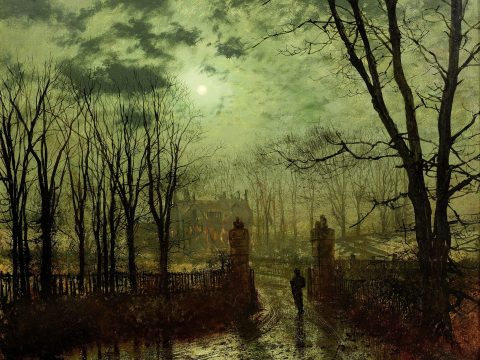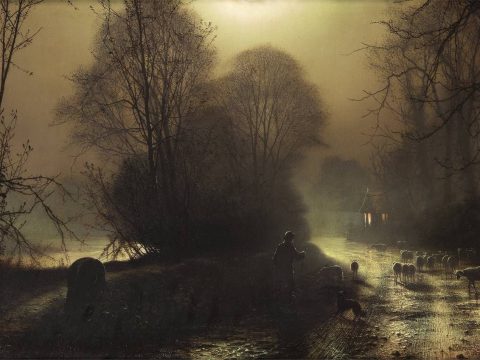
- in persuading God’s children that their estates are nought,
- in securing men unregenerate that their estates are good;
Especially in judging of our estates:
- the hand of self-love, which bribeth and biaseth, is found as deep in Corrupt Affections as in Carnal Reason.
But the work of humiliation, which prepares for faith, all those strongholds of carnal reason being demolished which upheld self-flattery, and that false good opinion of a man’s estate, and those mountainous thoughts of presumption as then laid low, a man is for ever put out of conceit with himself.
Last of all, as there are these corrupt principles of carnal reason and suspiciousness in us, to raise and foment these doubts and fears from God’s dealing towards us; so there is an abundance of guilt within us, of our false dealings towards him. And we have consciences, which remain in part defiled, which may further join with all those, and increase our fears and doubtings; and as we are dark and weak creatures, so guilty creatures also. And this guilt, like the waves of the sea, or the swellings of Jordan, does begin upon these terrible storms from God to rise, and swell, and overflow in our consciences. As in David, Ps. 38, when God’s wrath was sore upon him, ver. 1, 2, then also he complains, ‘mine iniquities are gone over my head,’ ver. 4. There is much guile and falseness of heart, which in those distempers, when our consciences do boil within us, and are stirred and heated to the bottom, doth, like the scum, come up and float aloft. Thus in David, when he was under the rod for his sin of murder, as the guilt of his sin, so the guile of his spirit came up, and he calls for ‘truth in the inward parts,’ Ps. 51:6. For as his sin, ver. 2, so his falseness of heart was ever before him; and with an eye to this he spake that speech, Ps. 32, Oh, ‘blessed is that man in whose spirit is no guile, and to whom the Lord imputeth no sin.’ Thus he spake when God had charged upon him the guilt of his sin, and discovered to him the guile of his spirit, ver. 4, 5. And this guile doth oftentimes so appear, that our consciences can hardly discern anything else to be in us; it lies uppermost, and covers our graces from our view: and like as the chaff, when the wheat is tossed in the fan, comes up to the top, so in these commotions and winnowings of spirit do our corruptions float in our consciences, whilst the graces that are in us lie covered under them out of sight; and the dark side of our hearts, as of the cloud, is turned towards us, and the light side from us.
And indeed there are in the best of us humours enough, which if they be stirred and congregated in our consciences, may alone cast us into these burning fits of trouble and distress; so as whilst God’s Spirit shall withhold from us the light of our own graces, and our own consciences represent to us the guile and corruptions that are in our best performances, our hearts may conclude ourselves hypocrites, as Mr Bradford in some of his letters doth of himself, and others of the saints have done. Yea, so as even our own consciences—which are the only principle now left in us which should take part with and encourage faith, and witness to us, as the office of it is, the goodness of our estates—in this may join with the former corruptions against us, and bring in a false evidence, and pronounce a false judgment. Even conscience itself, which is ordained, as the urine of the body, to shew the estate of the whole, and therefore is accordingly called good or evil as the man’s state is, this is apt in such distempers to change and turn colour, and look to a man’s own view as foul as the state of a very hypocrite.
And the reason of this is also as evident as is the experience of it. Even because conscience remains in part defiled in a man that is regenerate; and though we are ‘sprinkled from an evil conscience’ in part, yet not wholly: so as though our persons are fully discharged from the guilt of our sins, through the sprinkling of Christ’s blood, before God; yet the sprinkling of that blood upon our consciences, whereby we apprehend this, is imperfect. And the reason is, because this very sprinkling of conscience, whereby it testifies the sprinkling of Christ’s blood, and our justification thereby, is but part of the sanctification of conscience, as it is a faculty, whose office and duty is to testify and witness our estates; and therefore, as the sanctification of all other faculties is imperfect, so of conscience also herein. And hence it is that when God’s Spirit forbeareth to witness with conscience the goodness of our estates, and ceaseth to embolden and encourage conscience by his presence, and the sprinkling of Christ’s blood upon it against the remaining defilement, that then our consciences are as apt to fall into fears, and doubts, and self-condemnings, even as much as, when he withdraws the assistance of his grace, those other faculties are to fall into any other sin. And therefore, as the law of sin in the other members may be up in arms and prevail so far as to load us captive unto sin; so may the guilt of sin in our consciences remaining in part defiled, by the same reason prevail against us, and get the upper hand, and lead us captive to fears and doubtings, and cast us into bondage.
Thomas Goodwin. A Child of Light Walking in Darkness.



